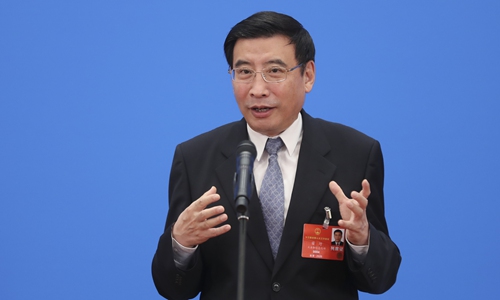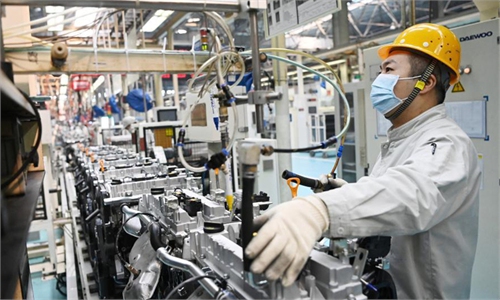
Chinese Minister of Industry and Information Technology Miao Wei gives an interview via video link after the second plenary meeting of the third session of the 13th National People's Congress at the Great Hall of the People in Beijing, capital of China, May 25, 2020. Photo: cnsphoto
China is positioned in the third tier of a four-tier global manufacturing hierarchy and is at least 30 years away from achieving its goal of becoming a strong manufacturing power, a senior official said on the sidelines of the two sessions on Sunday.
China's manufacturing industry has made marked progress lately, but the general view that it is "big, but not strong" and "comprehensive, but not excellent" has not fundamentally changed, Miao Wei, former head of the Ministry of Industry and Information Technology, said in a speech at the second plenary meeting of the fourth session of the 13th CPPCC National Committee.
Miao highlighted problems restricting the high-quality development of China's manufacturing industry.
The market-based pricing mechanism for production factors is not perfect, and the costs of energy, land and environmental protection don't fully reflect the relationship between market supply and demand or the degree of resource scarcity. The tax burden on enterprises remains heavy, and financial support for the manufacturing sector urgently needs to be strengthened, Miao said.
"Since the China-US trade and technology conflict began, the supply chain has been disrupted, and now we need to rebuild the competitiveness of the industry and supply chains on our own," Hong Tao, director of the Institute of Business Economics at Beijing Technology and Business University, told the Global Times, noting that the chip issue is also forcing China to make a change.
Miao said that the reason for the inadequate level of innovation in China's manufacturing sector is the repetitive, scattered and inefficient allocation of resources, and structural defects in the supply system of key generic technologies.
China also needs to speed up the development of qualified personnel to support the high-quality development of the manufacturing industry.
Miao said that there is a shortage of talent in emerging industries, and the proportion of innovative and highly skilled talent is low, which has become a major constraint to the development of the manufacturing industry. This issue warrants great attention to achieve enhanced development, Miao said.
Zhang Yansheng, chief research fellow with the China Center for International Economic Exchanges, told the Global Times on Sunday that Miao's remarks are intended to remind the nation that a clear path lies ahead, when China is about to enter the first tier through a great acceleration in the coming years.
China is embarking on a new era in which it competes with ones in the top tier in frontier areas, and this is where the China-US trade war and technology war came into being, said Zhang.
"China has entered the prime era of scientific and technological innovation, which is an era of acceleration. Because China has one of the biggest market application scenarios with high-quality consumer demand that no other country can match, the 'threat' to the US, from this perspective, is not illusory but real," said Zhang.
In the past five years, the annual growth rate of research and development (R&D) spending in China has been above 10 percent, said Zhang.
The country will aim to strive for 7 percent annual growth in R&D spending and forging a new development pattern, according to the Government Work Report delivered on Friday.
Global Times


